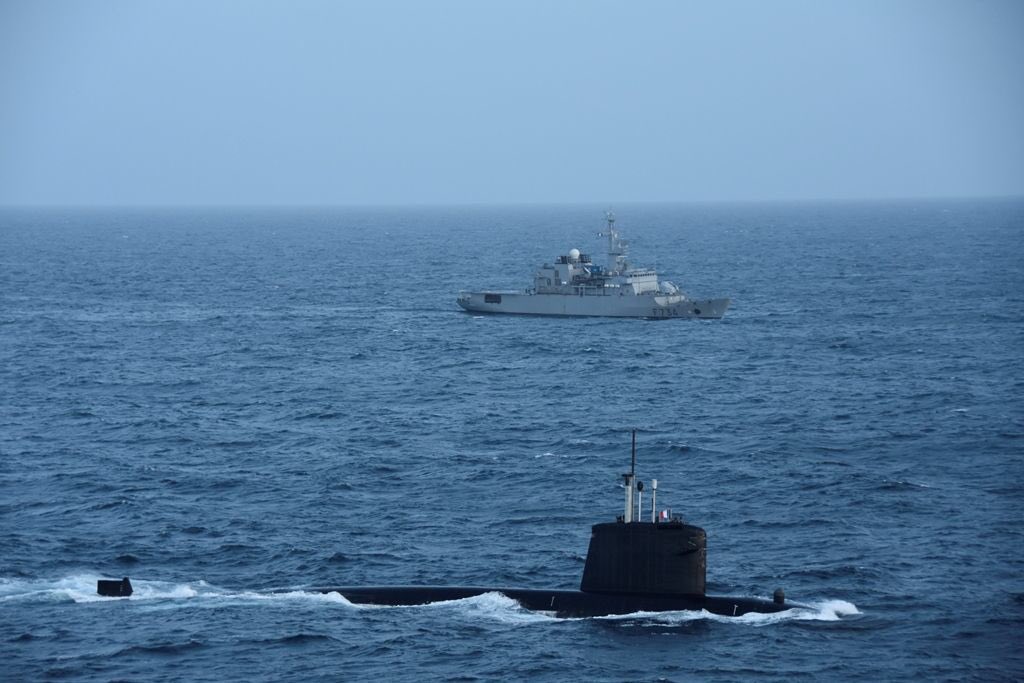Last week France put a nuclear submarine in the contested waters of the South China Sea, joining countries like the US, Australia and Japan to confront the Chinese challenge in the Indo-Pacific region.
French Defence Minister Florence Parly called it "a striking proof of the capacity of our French Navy to deploy far and for a long time in connection with our Australian, American and Japanese strategic partners". She announced through a tweet that the country has deployed submarine 'Emeraude' along with naval support ship 'Seine'. Parly added: "This extraordinary patrol just completed its passage in the South China Sea."
News website Naval News reported that before reaching the South China Sea, Emeraude had stopped over at Australia. It then visited the US naval base in Guam and participated in anti-submarine warfare exercise with the American and Japanese navies.
Many countries including the US, Japan, Australia, India, and lately Europeans powers, are coming together to challenge the aggression mounted by the communist country by launching attacks and violating the sovereignty of neighbouring countries in the South-East Asian region.
The French activity in the Info-Pacific region is part of a global effort to uphold international law in global sea lines of communications. In a similar move in 2019, French frigate 'Vendemiaire' had conducted unprecedented freedom of navigation operations in the Taiwan Strait amid rising tensions between China and Taiwan.
Read More: India-France military cooperation deepens with INS Vagir submarine
The French move to deploy a nuclear submarine in the contested waters of SCS comes in the backdrop of US President Joe Biden's warning of a new era of "extreme competition" with China a few weeks earlier. He had emphasised on the necessity to mount a joint response with like-minded allies in Europe and Asia.
In an article in Asia Times, Richard Javad Heydarian, says that the growing involvement of international powers from the Indo-Pacific and beyond belies Beijing's claims that maritime tensions in Asia are caused by American overreach. Heydarian says it is increasingly clear that Beijing is facing a concerted push back over its aggressive behaviour against smaller neighbours.
What is noteworthy is that the new American President has largely carried forward the policy of his predecessor Donald Trump regarding China minus the verbosity and rhetoric. The growing involvement of European nations in regional geopolitics is in line with the strategic priorities of the Biden administration's commitment to "working with our allies and partners" based "on the international rules of the road."
It is not just France. Chinese actions during the year of the coronavirus set alarm bells ringing in many a European nation. Last year, countries like Germany and the Netherlands revised their foreign policy outlook towards China and the broader Indo-Pacific region. In December last year the UK announced that it too would send its aircraft carrier Queen Elizabeth to the region in early 2021.
Read More: Trudeau sends Canada ship to exercise with US, Japan Navy in East China Sea
In its Indo-Pacific Strategy paper, 'French Strategy in the Indo-Pacific for an inclusive Indo-Pacific', Paris calls for "a stable, multipolar order based on the rule of law and free movement, and fair and efficient multilateralism." France has consistently maintained that it's a "resident power" in the Indo-Pacific, as it has territorial as well as strategic interests in the region.
French President Emmanuel Macron has adopted proactive regional diplomacy by expanding defence and economic ties with like-minded powers such as Australia and India. The Indo-French defence cooperation is growing not just in the skies through the sale of the Rafale aircraft but also in the design and manufacture of submarines. France is looking at a broader 'Paris-Delhi-Canberra axis' to take on China.
According to the latest, 'The State of Southeast Asia' survey, conducted annually by the Singapore-based think tank, Institute for Southeast Asian Studies (ISEA), European powers and Japan, "are the clear front-runners for ASEAN's most favored and trusted strategic partners in the hedging game against US-China rivalry."
The US had deployed its Nimitz Carrier Strike Group and Theodore Roosevelt Carrier Strike Group to the disputed waters "to demonstrate the US Navy's ability to operate in challenging environments," according to a statement by the US Navy.




















